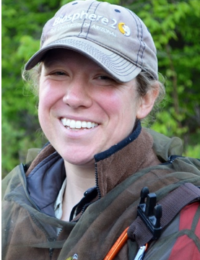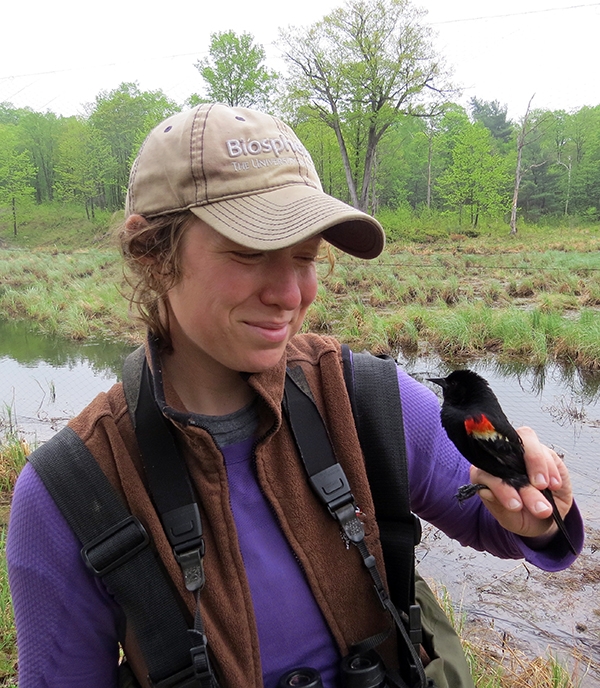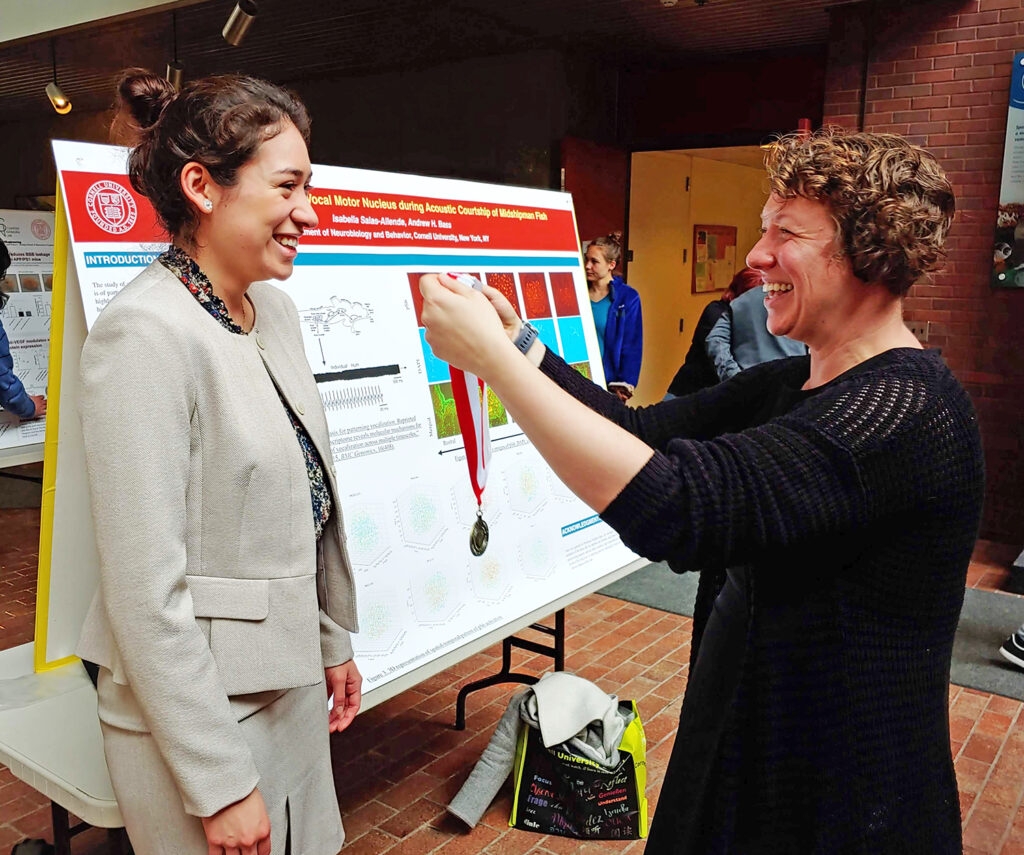IGC Alumni Spotlight: Dr. Laura Schoenle
July 1, 2020


Dr. Laura Schoenle, an Interfaces of Global Change alumna of 2017, now serves as Associate Director and Coordinator of Undergraduate Research and Honors within the Office of Undergraduate Biology (OUB) at Cornell University. She completed her PhD in Biological Sciences at Virginia Tech in May of 2017 under the mentorship of Dr. Ignacio Moore and Dr. Fran Bonier (Queen’s University). Before coming to Virginia Tech, she was a high school science teacher in Arizona, teaching biology and environmental science. Laura’s endeavors over the past 15 years provide her a wealth of knowledge and experience in the realms of academia and research. A fundamental drive weaves throughout her academic and professional career paths – working closely with people and sharing her passion for the life sciences through education.
Laura began her academic journey at Cornell as an undergraduate studying biology with ambitions to become a veterinarian. Initially, she wasn’t too keen on intensive research but loved the field experiences gained in animal behavior and evolutionary biology. She really enjoyed communicating with other people, which led into education and a 1-year master’s program in teaching. Then located in the Mid-west, she taught advanced biology and environmental courses to upper high school students for three years. She truly appreciated the professional development opportunities available to support teachers wanting to give their students an authentic learning experience.
See Laura’s IGC blog post (2016) on the National Center
for Science’s ‘Scientist in the Classroom’ program! 
One of the most influential endeavors during her time teaching was a GIS conservation research program through Arizona Partners in Science where she was paired with a professor from the University of Arizona. Their project was looking at wildfire burn severity around the mountains of Tucson and differences in bird populations across those areas. She took small groups of high schoolers out to learn how to do point counts and conduct daily field surveys one summer. She found that she really enjoyed the field work and research, which influenced her decision to pursue a graduate degree and ultimately join Dr. Ignacio Moore’s lab at Virginia Tech in 2012 to work on a collaborative project with Dr. Fran Bonier at Queen’s University.
While at VT, Laura’s primary focus was looking at the interaction between stress and disease in wild birds, and how physiological stress influenced the response to disease. Her study subject was the red-winged blackbird and avian malaria. She wanted to know how and why individual birds may be better at resisting or tolerating infection. Similar to current events and research of the Covid-19 virus, she asked questions such as ‘can a hyper-reactive immune response be responsible for more serious disease symptoms?’.
Dr. Dana Hawley, who was on Laura’s dissertation committee, said “Laura’s integrative research questions were cutting-edge and, in many ways, were prescient for the current COVID situation. There are studies now emerging that tentatively show that dexamethasone, a drug that mimics stress hormones similar to those that Laura studied in birds, may help humans survive COVID-19 infection. While these COVID studies still need full vetting, they build on some of the very same ideas that Laura tested in red-winged blackbirds. We still have very little understanding of why some individuals, whether birds or humans, are able to survive an infection relatively unscathed. Laura’s work probed the idea that stress hormones may be an important part of the story in explaining some of this individual variation, with stress hormones actually keeping the immune system in check in some cases.”

Laura was initially attracted to VT’s Interfaces of Global Change Interdisciplinary Graduate Education Program because she wanted to connect scientific training with practical applications, including policy and governance. She recalls the experiences from the Washington D.C. trip, science communication workshops and discussions in the IGC seminars as most impactful. The training opportunities and supportive network enabled her to become a better scientist with a broader interdisciplinary outlook. When asked what advice or insight she would share with current graduate students and IGC Fellows, Laura says, “I’ve found that the diversity in my interests and skills has been incredibly helpful in my career path. A teaching background, having trained a lot of undergrads myself, and spending effort on building my communication skills, as opposed to just focusing on being a good scientist and getting publications, has led to diverse opportunities. If you have time to try things out now, like outreach programs and mini-collaborations, you’ll learn about the career paths and options that may exist in your interest areas. Diversifying your skills as early as you can is valuable but also fun!”
Ignacio reminisces fondly on Laura’s time in the lab. “She had a combination of motivation and creativity that was a model for scientific success; and her presentations at conferences were amazing! She funded much of her work through grants and fellowships, including an EPA STaR fellowship. Her work was published in top journals and has received substantial attention from the scientific community in a short time. In fact, advising Laura was usually as simple as giving her some advice and getting out of her way!” While conducting her own graduate studies, she mentored multiple undergraduates who were often co-authors on papers. True to the pathway leading Laura to her current work at Cornell, at least one mentee was so enthused by the research project that she went onto graduate school herself to pursue a PhD.
After graduating with her PhD from VT in 2017, Laura worked as a post-doc in a partnership between the University of South Florida and Hamilton College in New York. The position was part of an NSF grant between two PIs at the universities to examine how immune function changes with the body size of animals. She worked to set up the program and two different labs at each institution from scratch, including project design, research protocols, and training the teams of people who would do the data collection and processing. The project has analyzed data from over 300 species of mammals and generated approximately 20,000 data points, and Laura continues to be involved with the project in a limited capacity.
Coming back full circle to Cornell University in 2018, Laura took on a multifaceted role as Assistant Director and Coordinator of Undergraduate Research and Honors at the Office of Undergraduate Biology, with an overarching goal to improve and support a positive undergraduate research environment for both students and faculty. In Fall 2022, she was promoted to Associate Director. In addition to providing academic and career advisement to students, she directs all research related programming for the department, working to develop and implement programs that build interest and enable access to scientific research to over 1,200 biology undergraduates and hundreds of non-biology majoring students at Cornell.

“One of the most rewarding aspects of my job is building relationships with students and being able to help them through the developmental process of their undergraduate careers,” says Laura. As part of the advising team, she typically mentors 10 to 20 students at a given time and her counseling focuses on anything research or graduate school related. “I love when students reach out after we’ve worked together and let me know how they’ve resolved the challenges they were facing or how our work together shaped their path forward. Many students are dealing with personal and professional struggles, and I am happy to be able to support them. Others seek guidance for how to navigate the research environment or how to pursue a career in science. It’s exciting to hear where they are heading next and what they accomplish after graduating.”
These days at Cornell, almost half of the incoming freshmen enter college with an established understanding of scientific research, and some have had direct experience in high school. To better engage with those less familiar with the scientific process, Laura and her team initiated a 5-week workshop series targeting first year students with no previous research experience. Cohorts of 20 to 35 undergrads discuss the basics of research and how to begin investigation; they also tour labs on campus, work on drafting letters of interest to faculty, and use case studies to gain a sense for potential challenges. Most of the students who want to pursue a research position have done so by the end of their sophomore year – awesome!
Laura’s impact at the OUB is widespread. One initiative has been working to improve the “Research for Credit” courses in the Biological Sciences unit by which students receive academic credit for their research efforts. Making changes to the undergrad research application process has improved the experience for both students and faculty by clearly identifying goals and expectations for the projects up front, making the markers for success readily transparent and mutually attainable. She’s also working with a colleague on campus to develop a faculty research manual to compile best practices for undergraduate research, mentoring strategies, funding sources and how to attract a diverse applicant pool of interested students.
For Laura, these projects have been fun and challenging. “I work with departmental curriculum leaders and administrators, diverse faculty and student focus groups to help set the students and the lab teams up for a successful collaboration. As part of the Interfaces of Global Change program at VT, the seminar discussions focused on communication and working with stakeholders who have different priorities. I use those skills all the time and most directly”.
Laura’s experience and knowledge as both a research scientist and educator have solidified trusting relationships with faculty, too. “Having research experience gives you a layer of credibility when working with faculty and other scientists. Being able to understand where they’re coming from and the types of problems they’re dealing with is really helpful in being able to figure out what support they need to mentor undergraduates well.”
Working as part of a dynamic and supportive working group has been a huge asset for Laura in her role at Cornell. Part of a team of seven people in the Office of Undergraduate Biology, everyone carries a different specialization (Laura’s being primarily research) and they work together to collaborate and cross programmatic boundaries. “The working environment is a little different than that of your typical research lab, and it’s something that I really enjoy. The OUB team is highly collaborative and we work together to provide individual students and the whole biological sciences community with the tools they need to be successful academically, professionally, and personally. I learn so much from my colleagues. Thanks to their support, every day I improve my ability to serve as an advisor and best guide our incredible, early career scientists.”











